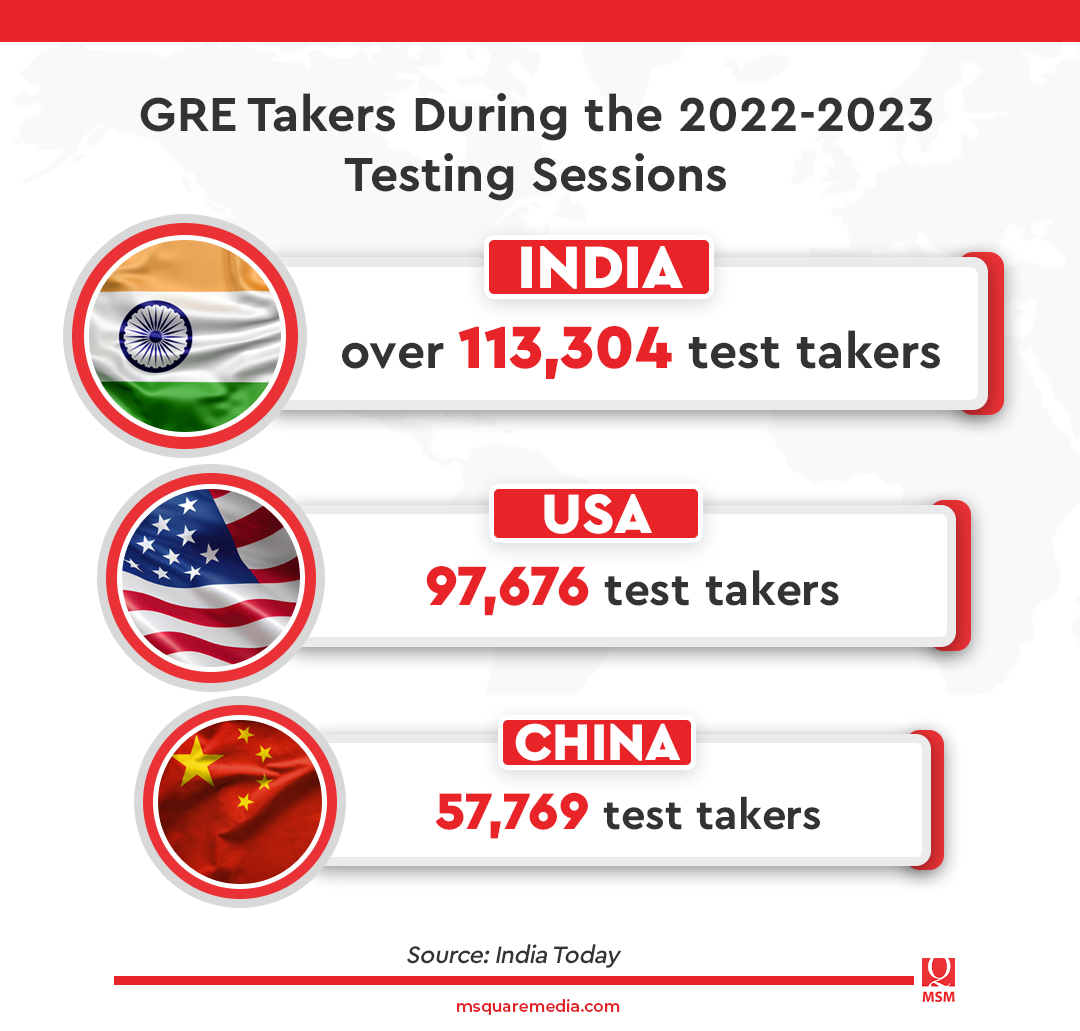Key Takeaways:
- India has become a hub for Graduate Record Examinations (GRE) takers, a sign of the rising demand for international education.
- The rise in GRE takers from India highlights the necessity for universities across the globe to modify their admissions policies to accommodate this growing population of applicants pursuing international education.
- The GRE’s growing acceptance by Indian higher education institutions underscores its significance as a gateway to international education.
For the first time in 80 years, India has surpassed the United States as the leading market for GRE takers. This signifies a dramatic change in the international education scene, showing India’s growing emphasis on higher education and its potential to become a key participant in education across the world.
The United States had 97,676 test-takers, China had 57,769, and India had more than 113,304 test-takers during the 2022–2023 testing session, according to recent data from the Educational Testing Service (ETS). A growing demand for higher education possibilities, notably among Indian students, is reflected in the notable increase in the number of Indian test-takers, up 62% from 69,835.

Impact of Growth on the Number of GRE Takers
Opening more GRE centers in India has significantly increased student accessibility, especially for those from smaller towns and rural areas. This growth has added to the GRE’s increasing significance in India’s cutthroat employment market, along with other initiatives like ETS’s GRE Mentor program. GRE, a standardized exam was first offered in 1936 for graduate school admission. The test assesses applicants’ abilities in analytical writing, critical thinking, quantitative reasoning, and verbal reasoning for graduate and business programs in the US and numerous other nations.
Additionally, the flexibility of the GRE, with scores valid for five years, gives students access to both Indian and foreign universities. For Indian students, particularly those who are interested in STEM fields, the GRE is an exam that makes sense because of its versatility. About 100 Indian higher education institutions, including business schools, now accept GRE scores, demonstrating the examination’s contribution to the internationalization of Indian higher education. This pattern highlights how educational institutions around the world must modify their admissions policies to accommodate this growing population of students looking for international education, fostering greater international cooperation in the field of education.
How GRE Improves Employability and Career Prospects
India’s competitive job market has contributed to the growing significance of the GRE among students. Indian students are realizing the importance of the GRE in improving their employability and career prospects, as businesses are placing a premium on applicants with advanced analytical, critical thinking, and problem-solving skills.
A high GRE score now serves as a crucial difference for students hoping to make a name for themselves in a crowded job market by demonstrating their intellectual capacity and preparedness for graduate work. According to an India Today report, strong analytical and mathematical skills are highly valued by employers in STEM professions, such as science, technology, engineering, and mathematics, where this preference is especially noticeable.
In addition, the GRE has developed into a means by which Indian students can gain admission to prestigious foreign colleges. Recognizing the importance of GRE results in determining an applicant’s fitness for graduate study, many American and international institutions and universities accept GRE results. Indian students’ desire for the exam has increased as a result of its adoption because it gives them access to higher education possibilities around the world.
The fact that the competitive job market in India has been a major factor in the rising number of GRE takers ultimately highlights the significance of this examination beyond academic admissions and its influence on students’ employment prospects in the future.
Moving Forward
Given that India remains the nation with the highest percentage of GRE takers, governments and educational institutions should take note of this trend and modify their approaches accordingly. This entails strengthening relationships with foreign universities, encouraging a research and innovation culture, and giving students the assistance they need to deal with the challenges of studying overseas. India can solidify its education leadership globally and enable its students to achieve success in the global arena by adopting these improvements. (RAGHWA GOPAL)

RAGHWA GOPAL
MSM CEO
Raghwa Gopal is a serial entrepreneur, academic, and software engineer by profession. Drawing from extensive business experience, Raghwa joined MSM from British Columbia’s Innovate BC, serving as president and CEO and helping companies start and scale to fuel technology development, commercialization, and adoption. As Accelerate Okanagan’s (AO) former CEO, he was a driving force in development of the tech sector, with a CA$1.6-billion economic contribution.
Raghwa studied at New Zealand’s Central Institute of Technology, Australia’s Collier MacMillan School, and the University of the South Pacific. He has strong ties to higher education as a former lecturer of business at UBC Okanagan, computer science at the School of Arts and Sciences, and entrepreneur-in-residence at Okanagan College School of Business.
His board memberships span across multiple organizations, such as the University of British Columbia, the India Canada Innovation Council, the Women’s Enterprise Centre, and the Province of British Columbia’s Emerging Economy Task Force.
Sources:
- Chakrabarty, R. (2024, February 20). India leads, US follows in GRE test-takers for first time in 80 years. What now? India Today. Retrieved from https://www.indiatoday.in/education-today/study-abroad/story/india-overtakes-us-in-gre-test-takers-for-first-time-in-80-years-what-it-means-2504852-2024-02-20
- A first in 80 years: More Indians than Americans write GRE test. (2024, February 19). Education Times. Retrieved from https://www.educationtimes.com/article/editor-s-pick/99734877/a-first-in-80-years-more-indians-than-americans-write-gre-test

